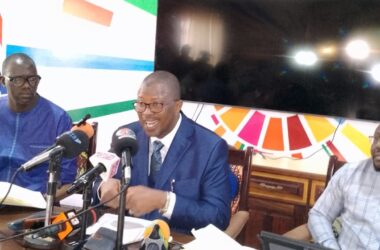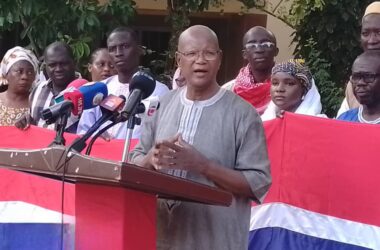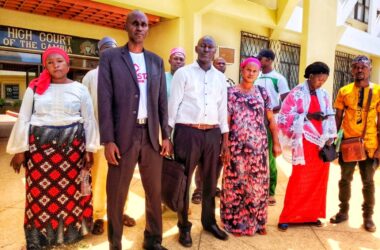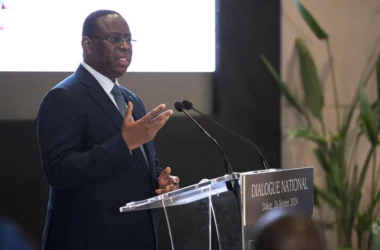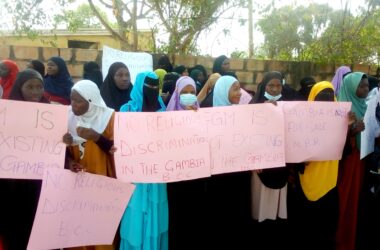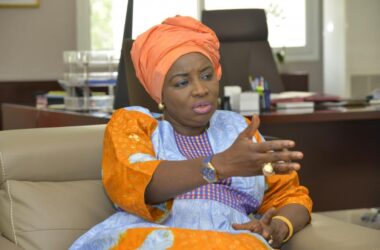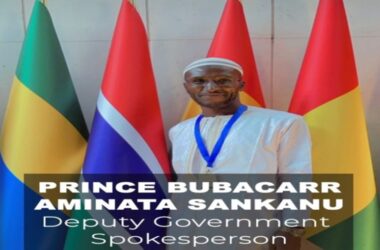Halifa Sallah, coordinator of the Gambian opposition National Alliance for Democracy and Development (NADD), has described President Yahya Jammeh’s governance system as one based on trial and error and lacking in hindsight in terms of the right strategy for a meaningful development. Mr Sallah blamed the reason for the ‘‘failure’’ of the past government under President Sir Dawda Kairaba Jawara as equally responsible for the ‘‘failing’’ path being trailed by the APRC led administration under a leadership that is lacking in a holistic view of society, development and the right strategy towards developing the society.
The Gambian politician who is a renowned sociologist of international repute was speaking to Jollof News in an exclusive interview, shortly before the country celebrated its 45th Independence anniversary.
‘‘Independence,’’ he said, ‘‘is a period of stock taking and not for celebration.’’
Mr Sallah may not be the only one with this rather popular line of argument that true independence comes with uncompromised sovereignty of the people, which currently happens to be a popular subject of worldwide discourse in the case of Gambia, but his usage of pertinent indicators to decipher the obvious shortcomings of the current regime appears too compelling to overlook.
‘‘You cannot separate democracy from the sovereignty of the people. And you cannot also separate the right to determine one’s manner of government from the duty of public trustee managing the affairs of the nation to promote the general welfare of the people, Sallah, a pan-Africanist and genuine militant for democracy who has dedicated his life to the noble mission of opening the consciousness of the masses to their sense of duties and responsibilities, argued. He added that the general welfare of a people encompasses liberty, protection of fundamental rights and prosperity.
Well known for his mind engaging argument based on empirical evidences, Sallah dismissed talks of infrastructural development as basis for measuring development, pointing out the APRC government’s inability to link its developmental projects as one of its greatest weaknesses in making greater impact on the productive base of the country’s economy.
In this first of a two part publication, Mr Sallah, who have carved himself a niche within the ranks of Kwame Nkrumah, Patrice Lumumba, Augustino Neto, Amilcar Cabral, Cheikh Anta Diop, Julius Nyrere, Jomo Kenyata and Haile Selassie, as amongst these rare Africans that continue to hold the Torch of Hope in the face of the era of darkness characterized by dictatorship and capricious tendencies perpetuated by the rulers over the ruled, will touch on Yahya Jammeh’s government’s marked failure in the area of youth employment, which he said is the main reason forcing the youth to take to rough seas in search of imaginary ‘greener pasture’. He will also delve on the education system, government’s misplaced priorities in terms of spending, as well as the conspicuous failure in the agricultural sector of the country, which has rendered many farmers hopeless in terms of their future.
Jollof News’ Gambian Affairs Editor, Abdoulie John, sat down with Mr Sallah…. Please continue reading the details of their discussion.
Jollofnews.com: Gambia is celebrating 45th Independence Anniversary. What does it really mean for you?
Halifa Sallah: The fundamental objective of Independence is to assert the right to self-determination of a people. The world came to a stage where it was seen that unless nations had their national rights respected (i.e. right to sovereignty, right to political independence, right to territorial integrity, right to national unity) world peace could not be conserved. This is why ultimately independence became the fundamental objective of all nations in the world.
We are commemorating 45 years of independence. But, in actual fact, if you look at the 1965 Constitution you will see that Gambia was a Constitutional Monarchy that still had a Governor General who owed allegiance to the British crown and who constituted a part of Parliament, comprising under the said Fundamental Law the Governor General and the House of Representatives. So, Gambia was still a Constitutional Monarchy. Why am I saying this?
Essentially, what should have been done on the 18th of February 1965 is to enlighten the Gambian people to know that we were on the road to self-determination, that the final phase is for Gambia to become a Republic and in becoming a Republic the people will be sovereign. The sovereignty of the people came with their power to determine their manner of government. So you cannot separate democracy from the sovereignty of the people. And you cannot also separate the right to determine one’s manner of government from the duty of public trustee managing the affairs of the Nation to promote the general welfare of the people (general welfare encompassing with liberty, protection of fundamental rights and prosperity). But if you look at the situation now, we are told that Gambia is a highly indebted poor country, 45 years after independence, and that 59% of the population are living in abject poverty (it has increased beyond the 60% mark). Prior, it was 69%, we were told that it was reduced to 59% and now we are saying that it has gone again above the 60%. In essence, the vast majority of peoples are living in abject poverty… Consequently, if we take into consideration the farming community, who constitutes 60% of the population, they are producing one crop of groundnut and that is not even being budgeted normally. They are investing fertilizers, earning inputs, even more expensive, and after producing their groundnuts or their vegetables, they find it difficult to get market, 45 years after independence! That is to say that the earning capacity of those people is very low, as government is buying groundnut at D8, 500 per ton. How many farmers will produce a ton of groundnut? We are talking about most farmers earning less than D8, 500 per annum.
In terms of schools, we are told that most of the schools, almost 80% of the Senior Secondary Schools, are privately owned. In most of these privately owned schools, if you don’t have between D5, 000 to D10, 000, you will not be able to educate a child. So it means that the child of that farmer would not be able to reach that particular level of education by virtue of the cast. And even after the person has finished school…
Additionally, we are also told that 185, 000 children are in our Lower Basic schools, over 60, 000 are in our Upper Basics Schools, 30, 000 in our Senior Secondary Schools. Within a period of twelve years all those children will be out of schools. We are talking about almost 300, 000 children. Now, where are the industries? (!!!) Where are the value added establishments capable of generating employments?
In the light of this, we have seen that unemployment constitutes a major problem for our youths. That is why most of them will struggle to leave the country in search of greener pastures.
Jollofnews.com: So for you there is no cause for celebration and instead people should take the opportunity to reflect on their objective conditions of living?
Halifa Sallah: My fundamental position is that this is a period for reflection. We need to sit down and ask ourselves the meaning of independence. My difference with quite a number of peoples is that we must be analytical in our assessment of our realities. Look at the country. Some will say today is better than yesterday. They have built schools, infrastructures etc… But clearly, we must look at the goal. The goal is to be able to marginalize poverty and then uphold prosperity. The contrary is taking place, as we are still marginalizing prosperity and upholding poverty!
From my own perspective, if I look at the society, I will say that we should have been far ahead than where we are today, both in terms of liberty and in terms of prosperity. Therefore this is a period of stocktaking and not celebration.
Jollofnews.com: Concerning the education sector how can we transform the system into a veritable tool of development?
Halifa Sallah: If you look at the perspective of independence of the African continent, you will definitely see that we do not have a holistic planning of our natural resources, social services, civil society, political and cultural realities. Clearly you have to have these five components, as there must be development at all of these levels.
In the case of the educational institutions, they have to be maintained with the fundamental objective to develop the productive base of the economy. Yes you can borrow and build structures, but after you have to train the teachers. Where are those trained teachers? We must be able to have trained teachers in all areas of the educational sector. If you build the structures, you have to have books. Where are the books? The libraries?
You have to go to the level of Grade 1 being linked to Grade 10, 12, Polytechnic and University. There must be linkages. Once you go into the Tertiary level, very young peoples are telling you I went to Gambia Technical Training Institute (GTTI), I cannot perform.
Jollofnews.com: Does this mean that the APRC government doesn’t have the policy of its means?
Halifa Sallah: That’s precisely what I am saying. In all sectors, it is trial and error governance. It is not a government that is having a holistic view of society, holistic view of development and strategically moving to develop the society.
Let me just give an example. They talk about infrastructural development. Fundamentally, any government with a holistic perception of infrastructural development would have known that the objective of infrastructural development is to promote the free movement of people and goods to be able to expand the economy. That’s why the past government has failed and the present government is failing. So, first and foremost, the government should have realized that we must build a road from Barra all the way to Fatoto and from Banjul to Fatoto. If there is a river, then we must have a bridge across to go into Fatoto. And we must also build a road from Banjul to Fatoto. This means you have linked the country. What is the next phase? You must have a nationwide transportation system.
Before you take D400, 000 000 from Social Security, a public establishment, to go and buy Ocean Bay Hotel and refurbish it, you could have built up a national transportation network where the whole nation will be served. As such, you will see that along the road many communities and businesses would have emerged and they would have a very free movement of goods and services throughout the country. So, you will have been building up the economy.
In terms of groundnut production, we are still having difficulties in purchasing it. In 2008, we were told that the price of groundnut in the world market was D36, 000 per ton, but clearly if you had a marketing agency within cooperative union of the farmers and they negotiated the prices, subtracting all the administrative costs, you would have enabled the farmers to continue to earn more from agricultural production and the cooperative union to be able to transport vegetables and fruits to the hotels area and marketing it outside of the country. This means that you will have a holistic conception of development because all sectors will be linked to all other sectors. But what we now have is fragmented development: they go and build there; they go and build there…. and you don’t see the interconnection. So, at the end of the day you will have infrastructures but they do not add up to boost up the productive base of the economy, nor do they promote the general welfare of the people. That is the problem we are having these days… To be continued.
Warning: Trying to access array offset on null in /srv/users/jollofnews/apps/jollofnews/public/wp-content/themes/wpzoom-prime-news/functions/widgets/carousel.php on line 39

